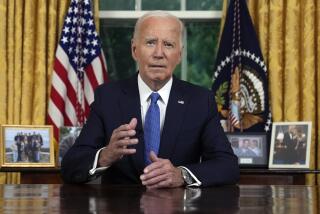Nixon Defiant, Vowing to Fight in Alternate Watergate Speech
- Share via
WASHINGTON — A week before Richard Nixon resigned, a defiant speech was prepared for him declaring he had done nothing “that justifies removing a duly elected president from office” and pledging to fight to keep his presidency.
The speech was never delivered. Instead, Nixon put out a written statement revealing the existence of the famous “smoking gun” tape--showing his complicity in the Watergate cover-up--and waited to judge how the nation reacted.
In the ensuing national outrage, Nixon saw that his presidency was doomed and gave up the fight.
The refusal-to-resign draft, a footnote to one of the most dramatic weeks of U.S. history, has come to light among the 40 million pages of Nixon documents at the National Archives.
Raymond Price, Nixon’s chief speech writer, prepared two drafts on Aug. 3 and 4, 1974: the undelivered text and a resignation speech marked “Option B.”
“Option B” became the basis of the speech Nixon delivered on Aug. 8, in which he told the nation he would resign the next day because “I no longer have a strong enough political base in the Congress.”
Alexander Haig, who was Nixon’s chief of staff, said last week that he ordered the drafts prepared at an “agonizing and wrenching” time.
The refusal-to-resign speech has Nixon conceding that he made “a serious mistake” in withholding knowledge of the damaging Watergate tape after listening to it the previous May. He surrendered the tape only when the Supreme Court ordered him to.
In his actual resignation speech--similar to the Price draft only in terms of themes--his mea culpa was softer: He said that “if some of my judgments were wrong, and some were wrong, they were made in what I believed at the time to be the best interests of the nation.”
The undelivered speech of defiance has Nixon say that, whatever his mistakes, “I firmly believe that I have not committed any act of commission or omission that justifies removing a duly elected president from office. If I did believe that I had committed such an act, I would have resigned long ago.”
In that text, Nixon says he would fight for the sake of the presidency.
Either draft could have been the vehicle by which Nixon informed the nation of the “smoking gun” tape. On that tape, Nixon is heard urging aides to use the CIA to halt the FBI investigation into the June 17, 1972 break-in at Democratic Party headquarters at the Watergate Hotel.
More to Read
Get the L.A. Times Politics newsletter
Deeply reported insights into legislation, politics and policy from Sacramento, Washington and beyond. In your inbox twice per week.
You may occasionally receive promotional content from the Los Angeles Times.










